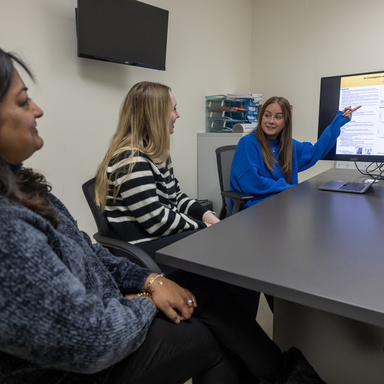By Will Bower
The Research Initiative in Science Education for Communication Sciences and Disorders (RISE-CSD) began this semester and is led by CSD faculty members Mili Kuruvilla-Dugdale and Beth Walker.
The 36-week program, funded by a $15,000 grant from the American Speech-Language-Hearing Association (ASHA), provides six undergraduate speech and hearing science students with unique opportunities.
“We know that undergraduate research experiences can facilitate student experiences in CSD, but students may face barriers that limit their access to participating in these activities,” Walker said. “The goal of RISE-CSD is to provide holistic support for undergrads in research skill development, leadership and career development, and professional network building.”

One of the students is Kelsey Eichbauer, who will graduate in spring 2027.
Eichbauer, a non-traditional student, began her college career in 2014 and resumed her studies in 2023 at a community college. She then transferred to the University of Iowa in fall 2024.
Eichbauer said her decision to return to college stems from an interest in understanding the intricacies of communication.
“I have two children (ages 3 and 8) and watching them develop language skills has been fascinating to me,” Eichbauer said. “Being a mother has made me realize how important communication is.”
She said she applied to the RISE-CSD program because it will help her achieve her long-term goals of pursuing higher education and working in an academic setting.
“Accumulating knowledge is something I hope to do endlessly,” Eichbauer said. “My hope is that this path will allow me to participate in and advocate for communication in various ways that allow me to serve my community.”
Research areas within the program include auditory neuroscience, aural rehabilitation, child language, cultural and linguistic disparities, fluency, motor speech disorders, pediatric audiology, and speech sound disorders. Eichbauer said her specific interests are wide-ranging, and she hopes to narrow them through her participation in the program.
One of the goals of RISE-CSD is to provide opportunities for students from a wide range of backgrounds and experiences.
“Being a non-traditional student comes with many challenges,” Eichbauer said. “I am very grateful that programs like RISE-CSD exist, helping to foster opportunities that aren’t always so easily available to students like me.”